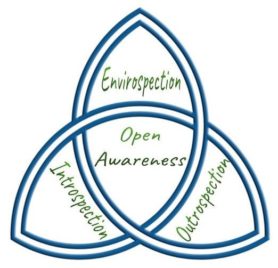Exploring the phenomenon of open awareness and its effects on stress and burnout
Abstract
This article introduces research in open awareness (OA). The qualitative research method of interpretative phenomenological analysis (IPA) was utilised to investigate the characteristic phenomena that are associated with the state and perspective of OA, including its effects in terms of stress resilience, burnout prevention and psychological well-being.The research project involved exploring the experiences of people with high stress and burnout levels who practiced the OA technique for 24 days. The overall outcome of this research suggests that the OA technique may promote resilience to stress, while helping to improve well-being and performance, which in turn may support the prevention and treatment of burnout. This conclusion is supported by current literature, covering how distress and the onset of burnout may be associated with chronic tunnel awareness, which the OA technique was found to counteract. Two distinct areas of future research are proposed involving OA with implications for social renewal.
Author: Jevon Dängeli
Published in the Journal of Consciousness, Spirituality & Transpersonal Psychology
Citation: Dängeli, J. (2020). Exploring the phenomenon of open awareness and its effects on stress and burnout. Consciousness, Spirituality & Transpersonal Psychology, 1, 76-91.
——————————————————————————
Open Awareness Inquiry: Introducing applied open awareness as an inquiry method for researchers to engage the transformative dimensions of consciousness
Abstract
This article introduces Open Awareness Inquiry – a participatory process that may aid qualitative researchers in the context of exploring the transpersonal and transformative dimensions of consciousness. Researchers will gain insight into the theory and application of Open Awareness (OA) Inquiry as a potential resource in qualitative research.
Characteristics of OA include rapport and mutual resonance (Bandler & Grinder, 1976; Siegel, 2013), a participatory perspective (Ferrer & Sherman, 2011), mindfulness (Siegel 2010), empathy (Watson, 2004), and a state of conscious awareness that moves individuals and groups away from a fixated tunnel awareness, to a state of openness, receptivity and equanimity (Dangeli & Geldenhuys, 2018). These characteristics indicate that OA may be beneficial in all three stages of research, as described by Anderson and Braud (2011). The authors encourage optimising a “context of discovery” in these stages of the research (2011, p. 189). By virtue of its inherent characteristics, OA promotes such a context of discovery.
Author: Jevon Dängeli
Published in the Integral Transpersonal Journal
Citation: Dängeli, J. (2020). Open Awareness Inquiry. Integral Transpersonal Journal, 14, 54-63.
——————————————————————————
Holding the liminal space in transpersonal coaching and therapy
Abstract
“Holding The Space” is the metaphorical container for the therapeutic interaction between the coach or therapist and client. Although the held space is largely intuitive, transpersonal practitioners who wish to teach, apply and develop its practice are faced with the challenge of reproducing it consistently and intentionally.
Some important aspects of the held space include energetic resonance and rapport, a participatory perspective, mindfulness, intentionally cultivated attitudes of acceptance, compassion and interconnectedness, and induction of a state of awareness of wider perspective and receptivity. We propose a unique mode of mindful perception ideally suited to Holding The Space, called “Open Awareness”. The characteristics of this state are a mindful mode of perception; metacognitive introspective awareness; extrospective and somatic awareness; a reframe of personal identification leading to a sense of interconnection; and a fluid, dynamic balance between conscious focus and peripheral awareness.
Open Awareness is simple enough to learn and apply quickly, and profound enough to evolve consciousness through regular practice. In general, the process begins with a shift of awareness to the physical senses, expansion and deepening to more subtle mental objects, and intentional resonance with the metaphorical space in between people and objects. The expansion of awareness is both inward (deep personal) and outward (interpersonal and transpersonal). Open Awareness is a distinct state, but shares characteristics with other disciplines such as Open Focus, Open Monitoring, Focused Attention meditation, and Focus-defocus practice.
We advocate Open Awareness as a useful tool for coaches and therapists and suggest research to develop further applications.
Authors: Jevon Dängeli and Hennie Geldenhuys
Published in the Integral Transpersonal Journal
Citation: Dängeli, J. & Geldenhuys, H. (2018). Open awareness: Holding the liminal space in transpersonal coaching and therapy. Integral Transpersonal Journal, 10, 117-63.
——————————————————————————
Transpersonal Coaching Psychology: An Introduction to the Theory and Practice
Abstract
Transpersonal Coaching Psychology (TCP) can be described as the theory and practice of coaching that takes a holistic and integrative approach to support client growth and transformation. The unique qualities and strengths of this approach to coaching are outlined, including how open awareness skills are applied as a means to hold a safe, compassionate and healing space for clients. TCP is trauma-informed and practitioners are also trained to differentiate between psychosis, burnout and states of consciousness that can be associated with spiritual awakening.
Author: Jevon Dängeli
Published in the Current Research in Psychology and Behavioral Science (CRPBS) Journal
Citation: Dängeli, J. (2023). Transpersonal Coaching Psychology: An Introduction to the Theory and Practice. Curr Res Psychol Behav Sci 4: 1083
——————————————————————————
The Transpersonal Coaching Psychology Journal
The Transpersonal Coaching Psychology (TCP) Journal is an open access peer-reviewed journal that publishes coaching case study projects conducted by graduates of the 1-year TCP Certificate Programme at Alef Trust.
TCP can be described as the theory and practice of coaching that takes a holistic and integrative approach to support client growth and transformation. Applied Open Awareness (OA) is the foundation of TCP. This journal demonstrates the value of TCP with OA, and illustrates how it works in practice.
